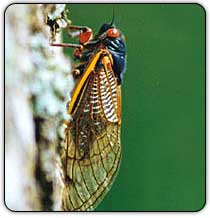Cicada Prime
 I've been reading a bit about cicadas lately. They're those really obnoxious bugs that come out of the ground every decade or so and freak everybody out. They're weird, kinda disgusting, and apparently they have an uncanny knack of always showing up in cycles of prime numbers. The 17-year cicadas are probably the most well known varieties, but there are closely related 13-year cicadas as well. Not being much of a bug lover, I was nevertheless intrigued by the fact these guys synchronize their emergence with such unlikely periodicity. Why primes?
I've been reading a bit about cicadas lately. They're those really obnoxious bugs that come out of the ground every decade or so and freak everybody out. They're weird, kinda disgusting, and apparently they have an uncanny knack of always showing up in cycles of prime numbers. The 17-year cicadas are probably the most well known varieties, but there are closely related 13-year cicadas as well. Not being much of a bug lover, I was nevertheless intrigued by the fact these guys synchronize their emergence with such unlikely periodicity. Why primes?Truth is I'm not much of a math whiz either, but I do know enough realize that prime sequences occurring in nature is a big deal. Mathematicians have been trying unsuccessfully to predict prime number sequences for ages. Could it be that nature already has the solution? Could the formula for a prime number generator somehow be locked in the genes of these strange insects?
I have to admit, after reading a few published research papers, I've become fascinated by the bizarre lifecycles of periodical cicadas. The primary advantage to their unusual mass emergence is something termed 'predator satiation'. Predators are completely overwhelmed by their numbers - cicada broods can appear by the million. The only way cicadas sustain this arrangement is by emerging infrequently enough to avoid predator build-up, and by being synchronized when they do emerge en mass. Their safety lies in numbers.
One of the most interesting things about periodical cicadas is the relatively recent discovery that somehow environmental triggers (possibly overcrowding) can cause entire populations of 17-year cicadas to switch their lifecycles and become 13-year cicadas. They're not two distinctly separate species that both happen to have prime cycles - both prime cycles exist in a common genetic heritage.
Scientists still don't completely understand all the hows and whys but, as fascinating as it all is, I'm now reasonably certain there's no holy grail of a prime number generator at the heart of it all. While no one really understands exactly why cicadas exhibit prime periodicity, I'm starting to picture how such a system could have evolved. Why primes? Probably for the same reason mathematicians think primes are so interesting - they have no common factors. At first I suspected it was a mechanism to keep separate cicada populations from competing for resources. The separate populations would almost never resynchronize to compete for limited resources (just once every 221 years). As unnatural as primes are, I figured prime periodicity must simply be the result of natural selection - over a very long trial and error process. It's easier to accept that 13 and 17 just happens to be where the struggling cicada populations ended up settling in, because it was the best fit after a lot of random fluctuation.
After reading a few more papers I realize my pet theory is an extreme oversimplification at best. There are a lot of other factors to consider, and the manner in which broods do occasionally overlap make mere competition for resources unlikely as the sole purpose for such a mechanism. Still I think the general idea is sound. By settling in on prime frequencies, the cicada is able to achieve a sort of advantageous disharmony with its environment, always taking its predators - or some other aspect of nature - by surprise. Hell, we're the only ones who would ever even notice a pattern. And cicadas probably found primes the same way we do - one at a time, by trial and error.
Dashed are my aspirations of cracking RSA and becoming rich and famous. A prime number generator would be amazing (and if it ever does get created in nature it will be in something like cicadas) but just two numbers, even primes, seems more coincidence than providence. If it takes modern computers hours to years to factor out large prime numbers, just remember it took evolution billions of years to find just two.




0 Comments:
Post a Comment
<< Home